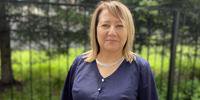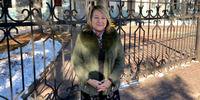The case of I. Lokhvitskaya in Birobidzhan
Filter
- #
D. Yankin, a senior investigator-criminalist of the investigative department of the FSB of Russia for the Jewish Autonomous Region, initiates 6 criminal cases for faith against 6 women at once: 57-year-old Irina Lokhvitskaya, 26-year-old Anna Lokhvitskaya, 26-year-old Tatyana Sholner, 35-year-old Tatyana Zagulina, 40-year-old Anastasia Guzeva and 41-year-old Nataliya Kriger . All six women are charged with part 2 of article 282.2 of the Criminal Code of the Russian Federation. According to investigators, they resumed the activities of the local religious organization of Jehovah's Witnesses in Birobidzhan, which was liquidated in 2016, as well as the Administrative Center of Jehovah's Witnesses in Russia. (Earlier, the defendants in the criminal case under similar articles were the husbands of Natalia Krieger, Tatyana Zagulina and Anastasia Guzeva - Valery Krieger, Dmitry Zagulin and Konstantin Guzev. And Irina and Anna Lokhvitsky were prosecuted after their son and husband Artur Lokhvitsky.)
- #
FSB investigator D. Yankin is initiating another case under Part 2 of Article 282.2 of the Criminal Code of the Russian Federation against 44-year-old Andrey Gubin. On the same day, I. Fedorov, a senior investigator of the FSB Investigation Department, opened a similar case against 55-year-old Oleg Postnikov. (A total of 19 criminal cases were initiated against 22 believers in the city.)
- #
The judge of the Birobidzhan District Court of the Jewish Autonomous Region, Vasilina Bezotecheskikh, without the participation of the parties, makes a decision on the appointment of a closed court hearing in the criminal case of Irina Lokhvitskaya. On the same day, three other women are being heard before the same judge. Among them are Anna Lokhvitskaya, Irina's daughter-in-law, as well as Natalia Krieger and Anastasia Guzeva.
The case will be considered behind closed doors, i.e. without the participation of the media, listeners and relatives. According to the judge, an open hearing of the case may lead to the disclosure of secrets protected by law - the personal data of minors whose data appear in the case file.
The next hearing is scheduled for September 29, 2020.
- #
The first court hearing on the merits is held. Even before the hearing, Judge Vasilina Bezotecheskikh decides that the case will be considered behind closed doors, that is, listeners, even relatives, will not be allowed. The believer submits 6 petitions, 3 of which are denied by the judge, including a motion to return the case to the prosecutor's office and to consider the case in an open trial. The judge postponed the decision on the petition to join identical cases against several believers submitted to the same court until the next hearing.
The next meeting is scheduled for 14:00 on October 16.
- #
Irina Lokhvitskaya asks the court to explain the reasons for the closed format of court hearings. The judge promises to do this later.
The believer speaks with an attitude to the accusation.
- #
Interrogation of a prosecution witness who was present at the search of the house of other believers. After the interrogation, he says that he sees Irina Lokhvitskaya for the first time.
- #
The prosecutor reads out volumes 22-25 of the materials of the criminal case.
- #
Interrogation of the prosecution witness. She claims that she did not hear any extremist statements from the defendant.
While watching the videos of the worship services, Irina draws the court's attention to the fact that there are no extremist actions or statements on them.
- #
Irina testifies in the Birobidzhan District Court. She explains that the meetings recorded in the case file are exclusively religious in nature: in a circle of acquaintances, believers sing religious songs, say common prayers, listen to Christian sermons, discuss biblical topics such as "Forgive each other", "Do you harbor anger or forgive?", "How to show prudence and love?", "Strengthen spirituality by showing love", etc.
The believer notes: "The Bible encourages a Christian to be a peacemaker - one who seeks peace and supports it where there is none. As I learn from God, I try to see the good in people rather than looking for flaws. This attitude helps me to respect people regardless of their faith and nationality. My life and my actions are exclusively peaceful."
Emphasizing the absurdity of the accusations, Irina says: "I have many friends. Imagine, for 27 years we have been friends, meet, communicate, but now the prosecutor's office says that we must stop all communication, do not invite guests, do not communicate on spiritual topics ... You know, it's like a musicologist, a fan of classical music, forbidden to listen to and talk about classical music. This is psychological violence ... The accusation itself is religious discrimination. All citizens are equal regardless of religious beliefs. Someone visits the temple every Sunday, someone wears the attributes of faith on his body, someone prays on a rug several times a day, so everyone professes his religion in his own way. As one of Jehovah's Witnesses, I profess my religion by studying the Bible, discussing it with others, and trying to live in harmony with what is written in the Bible."
In the characteristics of the defendant from the case materials, it is said that Irina is a conflict-free, calm and balanced person who does not communicate with persons of an antisocial orientation and has been repeatedly awarded for good work.
- #
Debate of the parties. The prosecutor requests for Irina Lokhvitskaya a sentence of 4 years in prison with restriction of liberty for 2 years with the requirement not to change her permanent place of residence and not to leave the city without notice, as well as to appear for registration 2 times a month.
Due to the judge's vacation, the debate is postponed to July 8.
- #
During the debate of the parties, the believer declares that she does not accept the ideas of extremism. The court did not present evidence of accusations of illegal activities of Irina, says her lawyer.
At the next meeting, the believer will deliver her last word. On the same day, the verdict may be announced.
- #
The last word of the defendant Irina Lokhvitskaya in Birobidzhan - #
Judge Vasilina Bezotecheskikh finds Irina Lokhvitskaya guilty of participating in the activities of a banned religious community. The believer was sentenced to 2.5 years probation and 1 year of restriction of freedom.
- #
The court of the Jewish Autonomous Region approves the decision of the court of first instance against Irina Lokhvitskaya. The sentence of 2.5 years of suspended imprisonment comes into force.
- #
In Vladivostok, the 9th Court of Cassation of General Jurisdiction upholds the verdict against Irina Lokhvitskaya.

